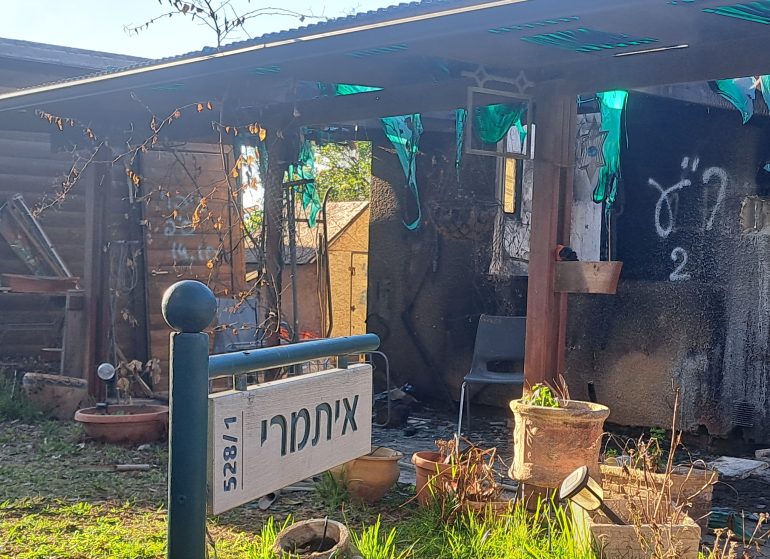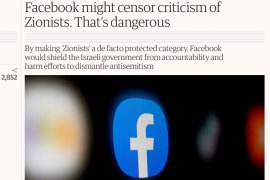Balas Berkovitz, a research fellow of the London Centre for the Study of Contemporary Antisemitism, recently published a paper at the journal K titled “The October 7th pogrom as a non-event on the Western left“, delving into the disturbing phenomenon of the pro-Palestinian left’s silence, and even excuse-making, in the face of Hamas’s sadistic orgy of antisemitic violence.
Berkowitz, in the immediate aftermath of Oct. 7, expressed the wish of many that, perhaps, there would be some soul-searching among supporters of the Palestinian cause, and a reaction along the lines of , at the very least, “this is not how we imagined Palestinian resistance,” or that they’d find more truthful words to designate the genocidal antisemitic motive at the core of the Hamas massacre.
But, he added, save a few voices, this was not to be, citing the impact of an rigid “ideological edifice constraining thinking” which forces adherents to “dismiss real-world evidence that could challenge their established interpretations”, which he likens to “the obstinate defense of Stalinism and Maoism, the denial of the existence of the Gulag, etc. [which] were…the hallmarks of much left-wing intelligentsia well into the…1960s”.
As Shany Mor argued, citing the Guardian rush to obscure the antisemitic atrocity by publishing a rash of columns in the immediate aftermath of Oct. 7 by accusing Israel of genocide, even while dead, burned and mutilated bodies – or, more often, parts or traces of what were once living human beings – were still being found: “Cognitive-dissonance reduction’ requires vilifying the victim to uphold one’s prejudices”. Cognitive dissonance reduction, Mor explained, is the process by which people reconcile new information that contradicts their firmly held priors.
Western activists for Palestinians, Mor added, “are dedicated to two nearly theological precepts: that Israel is evil, and that no Palestinian action is ever connected to any Palestinian outcome”.
Thus, for such ideological extremists, many of whom are granted platforms at the Guardian, the suffering of Gazans in the war that followed the medieval savagery meted out to Jews on that dark Shabbat day could never be connected to the decisions of Hamas leaders and their executioners – those who burst through the fences protecting peaceful communities like Be’eri, Kfar Aza and Kissufim to commit unspeakable crimes in the service of a fanatical ideology.
A recent Guardian column by Nesrine Malik (In Gaza, there’s a war on women. Will the west really ignore it because they’re ‘not like us’?) is typical of the outlet’s content over the past four months, save the fact that Malik is speaking as a woman who’s putatively particularly incensed by war crimes committed against her own sex – except, well, not quite.
So extreme is her contempt for Israel and Israelis, that she devotes a one-thousand word column to the suffering of women during the conflict and focuses entirely on women in Gaza, while ignoring the systemic rape, murder, torture, sexual mutilation of Israeli women and girls. Her piece does include five words mentioning sexual violence by Hamas, but the context is to accuse pro-Israelis of weaponising such crimes to “void sympathy for those in Gaza”.
Unlike most columnists at the outlet, Malik doesn’t even attempt a proper moral throat-clearing – the act of clearly condemning Hamas’s violence before pivoting to the desired vilification of Israel.
Though her description of the challenges faced by women, particularly pregnant women, in the war-ravaged territory is harrowing, if you read the entire piece – which is framed as the Israeli ‘war against women’ – it’s clear that Malik’s aim is to deflect attention away from Hamas terrorists who participated in indescribably cruel sexual violence against Jewish women and children by imagining that it’s Israelis who are engaged in a project of misogynistic brutality.
Malik, as we noted, isn’t alone.
In fact, the Guardian has been engaged in a de-facto editorial policy which we’d describe as a soft Oct. 7 denial – not outright denying that terrorist atrocities took place, as antisemitic conspiracy theorists do, but disseminating content day after day that changes the subject, obfuscating Hamas’s genocidal intentions and actions while projecting the terror group’s inhumanity and racism on to Israel. The Jewish victims, and not the annihilationist anti-Semites, are framed as the true genocidaires.
A more cruel, immoral and illiberal editorial line would be difficult to imagine.
Returning to Berkovitz’s piece, he writes that “in the death of Stalin, the Hungarian revolution of 1956, and the Prague Spring of 1968 disillusioned a lot of believers, prompting them to confess and to convert, and by the 1980s the Soviet bloc found itself without any substantial ideological backing by Western intellectuals”. As “the true oppressive nature of communism became evident”, he added, “more and more people started to doubt its principles, and, over time, periods arose where some more open-minded individuals and groups…who were once staunch supporters, began to question their own beliefs”.
He wasn’t drawing a direct parallel between Western idiots who supported Soviet totalitarianism and the pro-Palestinian left, but was arguing that there are historical precedents of extreme political movements changing course in reaction to cataclysmic events. Sadly, he concludes, by turning Hamas’s pogrom on Oct. 7th into a ‘non-event’, and by engaging in dissonance avoidance, obsessive Palestinian supporters at the Guardian and elsewhere – those who are engaged in an almost religious belief in the intrinsic righteousness of the cause – missed that opportunity.
Finally, the headline of this piece, ‘Can there be a decent pro-Palestinian left?’ is inspired by a piece in Dissent written in the aftermath of 9/11 by Michael Walzer, titled ‘Can there be a decent left?’ which pushed back against the reflexive anti-American and anti-Western fervor within the activist left after nearly 3,000 people in New York City, Washington, DC and Pennsylvania were murdered by al-Qaeda terrorists.
So, what would a decent pro-Palestinian left look like?
For starters, when protesting on the streets of London, Paris, New York City and elsewhere, organisers would have a zero tolerance policy towards antisemitic chants and tropes; and they’d consistently condemn Hamas’s atrocities on Oct. 7 without qualification and make clear that their movement rejects all manifestations of Palestinian violence and extremism.
Similarly, truly decent pro-Palestinian media outlets would assign agency to Palestinians and, especially, their leaders; they’d cease contextualising Hamas’s pogrom as an ‘understandable’ reaction to Israel’s blockade and (non-existent) occupation; they’d use their platform to consistently denounce the genocidal antisemitic agenda of the group which carried out the Oct. 7 massacre; they’d refuse to platform columnists who celebrated the Oct. 7 attacks; and, in line with their putative concern for the rights of all women, would devote considerable space to documenting and condemning the vicious sexual brutality against Israeli women and girls by Hamas.
In the aftermath of the worst antisemitic atrocity since the Holocaust, the anti-Zionist left has responded by turning it to a “non-event”, not only avoiding any serious self-reflection, but doubling down on their first principles concerning Israel’s ‘intrinsic villainy’.
There may one day be a decent pro-Palestinian left, but that day is clearly a long way off.
Related Posts
After Hamas’s antisemitic massacre, the Guardian hates Israel more





